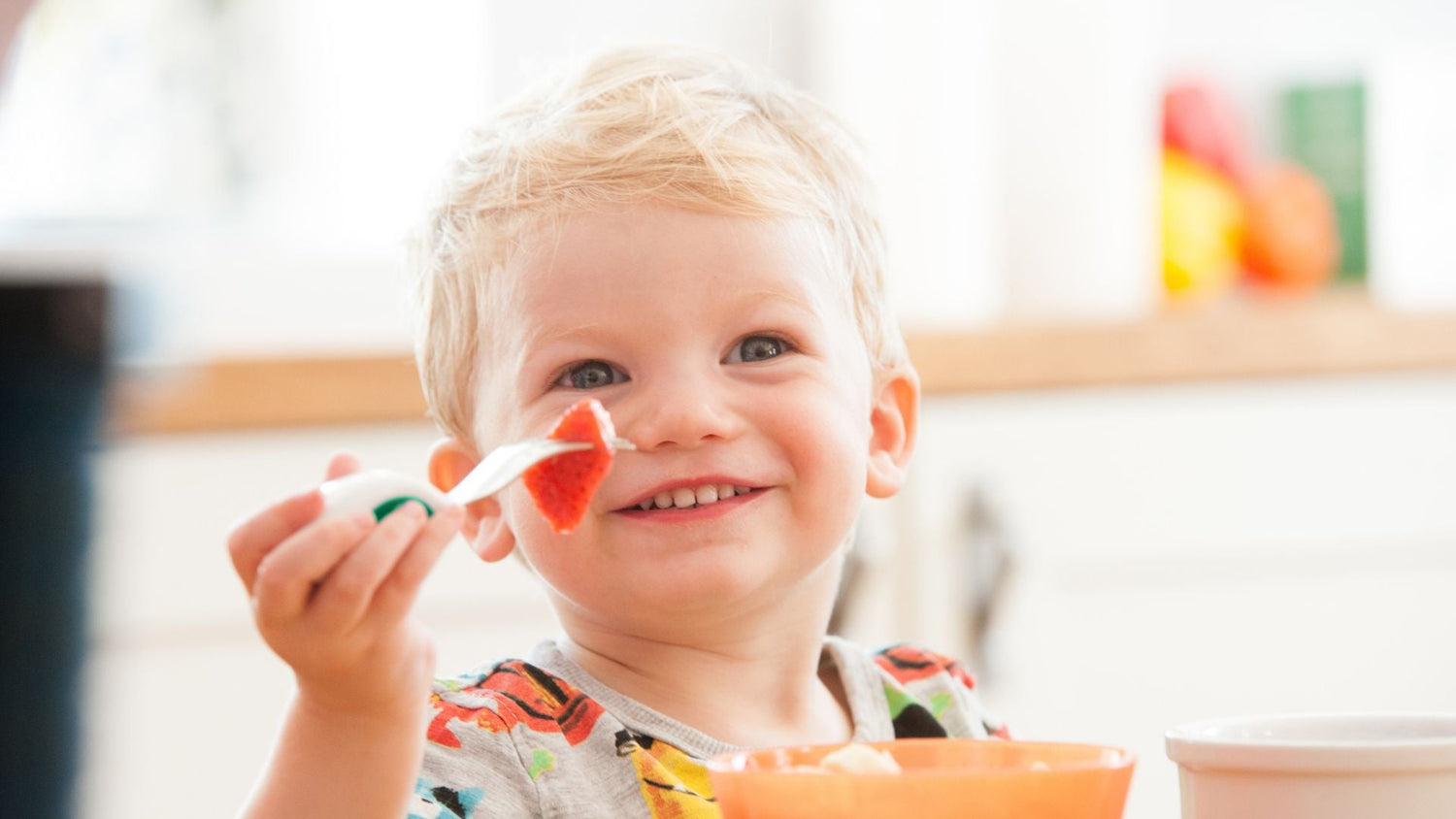If you've ever found yourself pondering the mysteries of your toddler's digestive system whilst cleaning up yet another explosive nappy or wondering why your little one seems perpetually grumpy after certain meals, you're definitely not alone.
The world of toddler gut health can feel like navigating uncharted territory – one day everything seems fine, the next you're dealing with constipation that would make a grown adult weep.
But here's the thing: understanding your toddler's gut health doesn't require a medical degree or endless hours of internet research that leaves you more confused than when you started. It's actually quite fascinating when you think about it – this tiny human's digestive system is working overtime, not just processing food but literally shaping their overall health, mood, and development.
In this guide, we'll explore:
- What gut health really means for toddlers
- How to spot when things might be a bit off-kilter
- And most importantly, simple ways you can support your child's digestive wellness without turning mealtimes into a battlefield or your kitchen into a laboratory.
Understanding toddler gut health

Think of your toddler's gut as their body's very own bustling ecosystem – and what an incredible ecosystem it is! This isn't just about processing the seemingly endless stream of snacks, meals, and mysterious objects they've decided look edible. Your little one's digestive system is actually their body's command centre for so much more than you might imagine.
The gut microbiome – essentially a vibrant community of bacteria, fungi, and other microorganisms living in the intestines – plays a starring role in your toddler's immune function. In fact, roughly 70% of the immune system is housed in the gut, which explains why children with healthy digestive systems often seem to bounce back from minor illnesses more quickly. It's like having a personal army of tiny defenders working around the clock.
But the plot thickens! This bustling gut community also influences brain development and mood regulation through what scientists call the ‘gut-brain axis’. Ever noticed how your toddler becomes particularly cranky when their tummy's upset? That's not just coincidence – there's genuine communication happening between their digestive system and their developing brain.
During toddlerhood, this microbiome is still very much under construction. Unlike adults, whose gut bacteria communities are relatively stable, toddlers' digestive ecosystems are constantly evolving and adapting. This makes it both an incredibly important time for establishing healthy patterns and, thankfully, a period when positive changes can have particularly significant impacts.
Nutrient absorption matters more than you think.
The gut is responsible for absorbing nutrients that fuel your toddler's rapid growth and development. When everything's working well, they're extracting vitamins, minerals, and energy from their food efficiently. When things are out of balance, even a nutritious diet might not be delivering all the benefits you'd expect.
Every child's gut is wonderfully unique.
What's particularly fascinating is how individual each child's gut microbiome is – rather like a fingerprint, but infinitely more complex. This explains why some toddlers can seemingly eat anything without issue whilst others have more sensitive systems.
Understanding this uniqueness can help take some pressure off the "am I doing something wrong?" worries that many parents experience.
Signs and symptoms of poor gut health

Spotting gut health issues in toddlers can sometimes feel like trying to solve a puzzle with pieces that keep changing shape. Unlike older children who can articulate "my tummy hurts," toddlers communicate digestive discomfort in their own unique ways – and it's not always as straightforward as you might expect.
Digestive symptoms
Digestive symptoms are often the most obvious indicators, though they can vary dramatically between children. Chronic constipation is surprisingly common and might manifest as infrequent bowel movements, hard stools, or your little one seeming uncomfortable when trying to go. On the flip side, persistent loose stools or frequent episodes of diarrhoea can also signal gut imbalance. Some children experience bloating – you might notice their tummy looks unusually rounded or they seem uncomfortable after eating.
Food sensitivities can be particularly tricky to identify because reactions aren't always immediate. Your toddler might seem fine during meals but become cranky or develop digestive symptoms hours later. Unlike allergies, which typically cause obvious reactions, food sensitivities create more subtle, delayed responses that can be challenging to connect to specific foods.
Behavioural changes
Many parents don't initially connect their child's increased irritability, mood swings, or general grumpiness to digestive issues. But when the gut-brain connection is disrupted, it can genuinely affect temperament. You might notice your usually cheerful toddler becoming more prone to tantrums, particularly around mealtimes or in the hours following certain foods.
Sleep disruptions can also indicate gut imbalance. Children experiencing digestive discomfort might have trouble settling at bedtime, wake frequently during the night, or seem restless even when they do sleep. Sometimes this creates a frustrating cycle where poor sleep affects digestion, which then further disrupts sleep patterns.
Appetite changes
Some children with gut issues become increasingly picky eaters – not necessarily out of defiance, but because certain foods genuinely make them feel unwell. Others might seem constantly hungry but never satisfied, possibly indicating absorption issues. Alternatively, some toddlers lose interest in food altogether, which can be particularly concerning for parents.
It's worth noting that many of these symptoms are common parts of normal toddler development – the key is recognising patterns or persistent issues rather than isolated incidents. Trust your parental instincts; you know your child better than anyone else.
Factors affecting toddler gut health
The factors influencing your toddler's gut health are surprisingly diverse, ranging from obvious dietary choices to subtle lifestyle elements you might not have considered. Understanding these influences can help you make informed decisions without becoming overwhelmed by trying to control every variable.
Dietary factors
These probably spring to mind first, and with good reason. Highly processed foods, whilst convenient and often toddler-approved, can disrupt the delicate balance of gut bacteria. These foods typically lack the fibre that beneficial bacteria need to thrive, whilst often containing additives that some sensitive systems struggle to process. Excessive sugar intake – including natural sugars when consumed in large quantities – can feed less beneficial bacteria, potentially leading to imbalances.
However, it's not just about avoiding certain foods. Insufficient fibre intake is incredibly common in toddler diets, partly because many traditional "kid-friendly" foods are naturally low in fibre. Without adequate fibre, beneficial bacteria can't flourish, and digestive transit can become sluggish.
Lifestyle factors
Physical activity helps stimulate healthy digestion – those toddlers who are constantly on the move aren't just burning energy, they're actually supporting their digestive systems too. Conversely, too much sedentary time can contribute to sluggish digestion.
Stress might seem like an adult concern, but toddlers experience stress too, whether from major life changes, disrupted routines, or even the normal challenges of learning to navigate their expanding world. Chronic stress can significantly impact gut health by affecting the gut microbiome and digestive function.
Sleep patterns also influence gut health in ways that might surprise you. Poor sleep can disrupt the body's natural rhythms, including digestive processes. This creates another of those frustrating cycles where gut issues affect sleep, which then further impacts digestive health.
Medical interventions
Antibiotics, in particular, are incredibly effective at fighting infections but don't discriminate between harmful and beneficial bacteria. If your toddler has needed antibiotics, their gut microbiome might need some extra support to recover fully.
Environmental factors like exposure to overly sanitised environments can also play a role.
Whilst good hygiene is essential, some exposure to everyday bacteria actually helps develop a robust immune system and healthy gut microbiome. It's about finding balance rather than creating a sterile bubble.
The encouraging news? Many of these factors are within your influence, and small, consistent changes often yield significant improvements over time.
How to improve toddler gut health

Supporting your toddler's gut health doesn't require a complete lifestyle overhaul or turning every meal into a nutrition science experiment. Instead, it's about making gentle, sustainable changes that work for your family whilst keeping mealtimes enjoyable rather than stressful.
Dietary strategies form the foundation of gut health support, but they don't have to be complicated. Here are the key areas to focus on:
Fibre-rich foods: Gradually increase fruits, vegetables, and whole grains in your toddler's diet. The key word is "gradually" – sudden increases can cause temporary digestive upset.
Tip: Add a new colourful food alongside familiar favourites rather than replacing entire meals.
Probiotics: These beneficial bacteria help restore gut balance. Natural yoghurt with live cultures, kefir, and mild fermented foods are toddler-friendly options.
Tip: Start with tiny amounts – even a small spoonful of yoghurt can be beneficial.
Prebiotics: These feed the good bacteria already in your toddler's gut. Foods like bananas, garlic (hidden in cooking), onions, and asparagus are excellent sources.
Tip: Many prebiotics are found in foods toddlers already enjoy, so you might be doing better than you think!
Hydration: Proper hydration keeps everything moving smoothly through the digestive system.
Tip: If your toddler resists plain water, try adding cucumber slices or fruit for natural flavouring.
Positive mealtime environments: Relaxed, unhurried mealtimes support better digestion.
Tip: Allow extra time for meals and reduce distractions like television – your toddler's tummy will thank you.
Self-feeding: When toddlers feed themselves, they eat more slowly and tune into hunger cues, both supporting healthy digestion.
Tip: Toddler cutlery designed for small hands make independent eating more successful and less stressful for everyone.
Physical activity: Active play, dancing, or family walks stimulate healthy digestion.
Tip: Even 10 minutes of movement after meals can help food move through the digestive system.
Sleep hygiene: Consistent sleeping patterns and calming routines allow the body's natural repair processes to function optimally.
Tip: A well-rested toddler often has better appetite regulation and digestion.
Remember, changes take time to show effects, so patience is essential. Small, consistent efforts often prove more effective than dramatic short-term changes.
When to seek professional help
While most toddler digestive concerns are perfectly normal, there are times when professional guidance becomes valuable for peace of mind and appropriate support.
Consider consulting your health visitor or GP if you notice:
- Persistent symptoms that continue for several weeks despite gentle interventions or seem to be worsening
- Severe constipation that doesn't respond to increased fluids, fibre, and activity, or causes significant distress
- Ongoing diarrhoea that lasts more than a few days and risks dehydration
- Significant behavioural changes like persistent irritability or mood swings that coincide with digestive symptoms
- Feeding difficulties beyond typical pickiness – refusing entire food groups, gagging on previously accepted textures, or showing pain when eating
Keeping a simple symptom diary for a week before appointments can be helpful – note what your child eats, bowel patterns, sleep quality, and any behavioural changes.
Remember, seeking professional guidance isn't failure; it's proactive parenting. Trust your instincts, you know your child best, and if something feels concerning, it's always appropriate to seek advice.
Go with your ‘gut’

Supporting your toddler's gut health might feel like yet another item on an already overwhelming parenting to-do list, but the reality is far more encouraging than that. You don't need to become a nutrition expert or transform your entire household routine to make a meaningful difference in your little one's digestive wellness.
The beauty of gut health support lies in its simplicity – small, consistent choices that gradually build a foundation for lifelong digestive wellbeing. Whether that's offering a variety of colourful foods, encouraging independent eating with toddler cutlery, ensuring adequate hydration, or simply creating calm, enjoyable mealtimes, these gentle approaches often yield the most sustainable results.
If you're feeling overwhelmed by conflicting information or unsure where to start, remember that simple often works best. Focus on offering a variety of wholesome foods, encouraging active play, maintaining consistent routines, and trusting your instincts about what your child needs.
Your toddler's gut health is a journey, not a destination, and you're already doing more to support it than you might realise. Every positive choice, no matter how small, contributes to building a strong foundation for their overall health and wellbeing.
Frequently asked questions
What are the symptoms of leaky gut in toddlers?
Leaky gut symptoms can include bloating, cramps, constipation, diarrhoea, headaches, fatigue, skin rashes, and increased allergies or food sensitivities.
You might also notice inflammatory symptoms like eczema, mucous congestion, or abdominal pain. However, these symptoms can have many causes, so it's important to consult with a healthcare provider rather than self-diagnosing.
Is it normal for toddlers to have a potbelly?
Yes, it's completely normal for toddlers to have rounded tummies! This "potbelly" appearance is typical due to their developing abdominal muscles and the proportions of their growing bodies. It's not usually a sign of digestive issues unless accompanied by other concerning symptoms like persistent pain or bloating.
How long does it take to improve gut health in toddlers?
While some improvements in mood or energy might be noticed within a few days of dietary changes, more significant changes in gut health typically take several weeks to months. The gut microbiome needs time to adjust and rebalance, so patience and consistency with positive changes are key to seeing lasting improvements.




Hinterlasse einen Kommentar
Diese Website ist durch hCaptcha geschützt und es gelten die allgemeinen Geschäftsbedingungen und Datenschutzbestimmungen von hCaptcha.